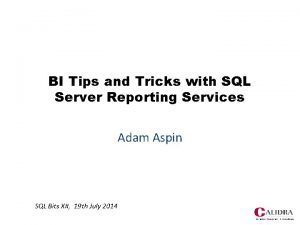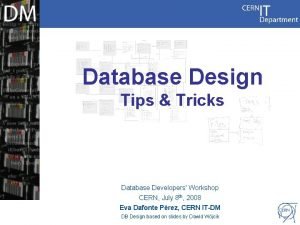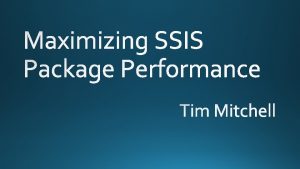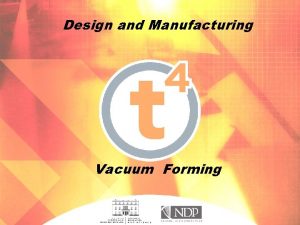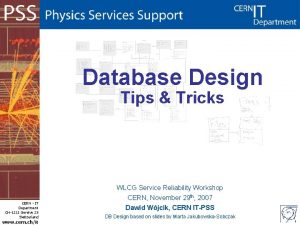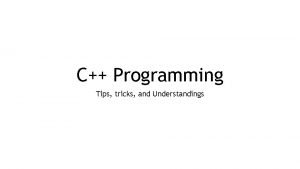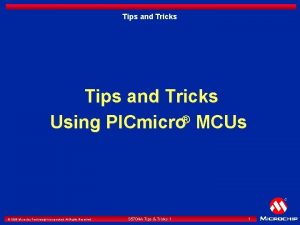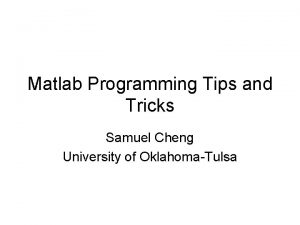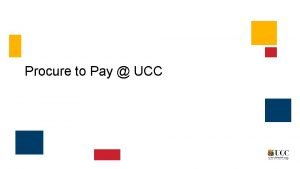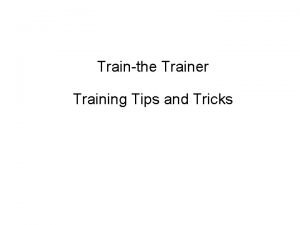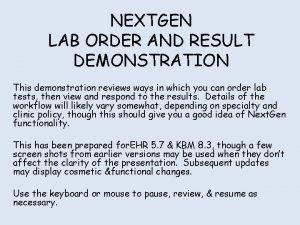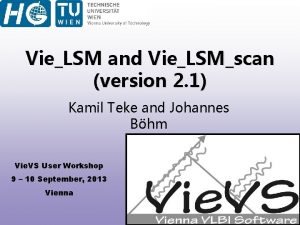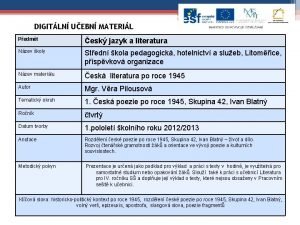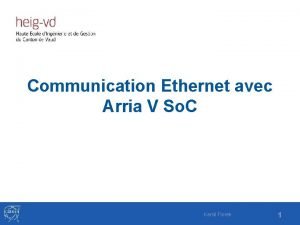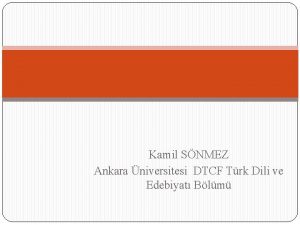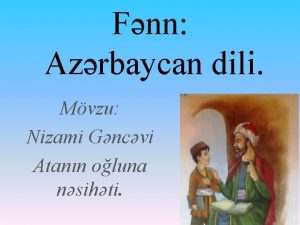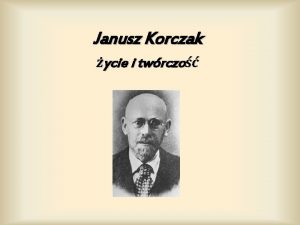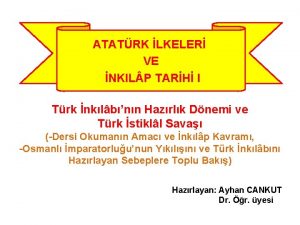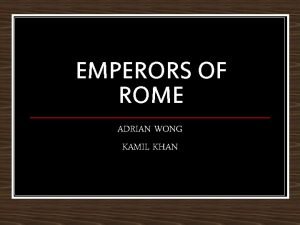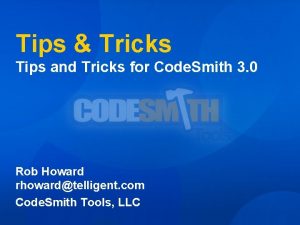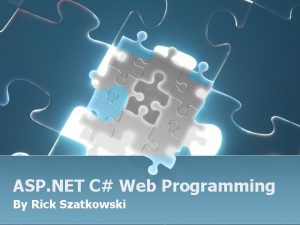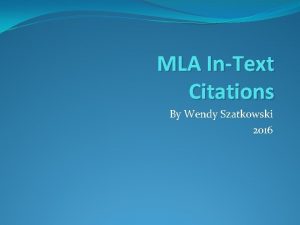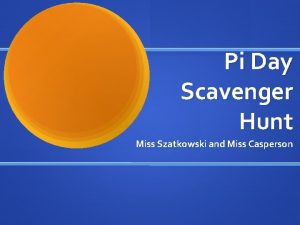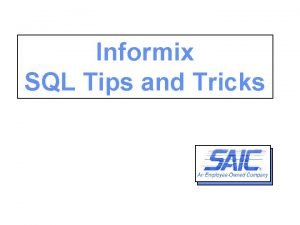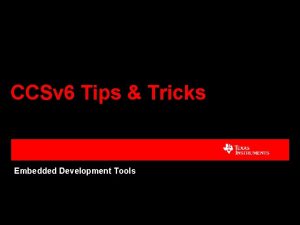Modern C tips tricks Kamil Szatkowski kamil szatkowskinokia















![Question 5 Will it compile? int array[] = { 1, 2, 5. 5 }; Question 5 Will it compile? int array[] = { 1, 2, 5. 5 };](https://slidetodoc.com/presentation_image/3f5829670a40bc73839a88fcfe3652d6/image-16.jpg)
![Question 5 Will it compile? int array[] = { 1, 2, 5. 5 }; Question 5 Will it compile? int array[] = { 1, 2, 5. 5 };](https://slidetodoc.com/presentation_image/3f5829670a40bc73839a88fcfe3652d6/image-17.jpg)




![Question 8 a What is the type of g 1? Gadget items[10]; auto g Question 8 a What is the type of g 1? Gadget items[10]; auto g](https://slidetodoc.com/presentation_image/3f5829670a40bc73839a88fcfe3652d6/image-22.jpg)
![Question 8 a What is the type of g 1? Gadget items[10]; auto g Question 8 a What is the type of g 1? Gadget items[10]; auto g](https://slidetodoc.com/presentation_image/3f5829670a40bc73839a88fcfe3652d6/image-23.jpg)
![Question 8 b What is the type of g 2? Gadget items[10]; auto & Question 8 b What is the type of g 2? Gadget items[10]; auto &](https://slidetodoc.com/presentation_image/3f5829670a40bc73839a88fcfe3652d6/image-24.jpg)
![Question 8 b What is the type of g 2? Gadget items[10]; auto & Question 8 b What is the type of g 2? Gadget items[10]; auto &](https://slidetodoc.com/presentation_image/3f5829670a40bc73839a88fcfe3652d6/image-25.jpg)






















![Question 18 Which line will not compile? A. [](){}; B. []{}; C. {}; D. Question 18 Which line will not compile? A. [](){}; B. []{}; C. {}; D.](https://slidetodoc.com/presentation_image/3f5829670a40bc73839a88fcfe3652d6/image-48.jpg)
![Question 18 Which line will not compile? A. [](){}; B. []{}; C. {}; D. Question 18 Which line will not compile? A. [](){}; B. []{}; C. {}; D.](https://slidetodoc.com/presentation_image/3f5829670a40bc73839a88fcfe3652d6/image-49.jpg)
![Question 19 Which lambda function is correct? A. []() -> int { return 4; Question 19 Which lambda function is correct? A. []() -> int { return 4;](https://slidetodoc.com/presentation_image/3f5829670a40bc73839a88fcfe3652d6/image-50.jpg)
![Question 19 Which lambda function is correct? A. []() -> int { return 4; Question 19 Which lambda function is correct? A. []() -> int { return 4;](https://slidetodoc.com/presentation_image/3f5829670a40bc73839a88fcfe3652d6/image-51.jpg)






















- Slides: 73

Modern C++ tips & tricks • • • Kamil Szatkowski, kamil. szatkowski@nokia. com Łukasz Ziobroń, lukasz. ziobron@nokia. com 2016 -11 -15 1 11/2/2020 Public © Nokia 2015

About authors Kamil Szatkowski Łukasz Ziobroń • Work @ Nokia: - C++ software engineer @ CCH - C++ software engineer @ LTE Cplane - C++ software engineer @ LTE CPlane - Python developer @ LTE LOM - Code Reviewer - C++ software engineer @ LTE OAM - Scrum Master • Trainer: - PARO 2015, PARO 2016 - Nokia Academy • Speaker: - AMPPZ 2015 - code: : dive community - AMPPZ 2015 - code: : dive 2016 - code: : dive community - code: : dive 2015 - code: : dive 2016 • Blogger: - netrix. org. pl 2 11/2/2020 Public © Nokia 2015 • Blogger: - ziobron. net

Introduction to C++ standards C++ standarization history • • 1998 – first ISO C++ standard 2003 - TC 1 (“Technical Corrigendum 1”) published as (“C++03”). Bug fixes for C++98 2005 - “Technical Report 1” published 2011 – ratified C++0 x -> C++11 2013 – full version of C++14 draft 2014 - C++14 published (minor revision) 2017? – big standard modification planned as C++17 3 11/2/2020 Public © Nokia 2015

Introduction to C++ standards Compilers support C++11 support C++14 support • Selected features from C++11 - gcc 4. 3, clang 2. 9 • Basic functionality - gcc 4. 9, clang 3. 3 • Full support – gcc 5, clang 3. 4 • Full support - gcc 4. 6, clang 3. 3 • Compiler flag: - -std=c++0 x - -std=c++11 – since gcc 4. 7, clang 3. 3 • More details: - http: : //gcc. gnu. org/projects/cxx 0 x. html - http: //clang. llvm. org/cxx_status. html 4 11/2/2020 Public © Nokia 2015 ‑ -std=c++1 y ‑ -std=c++14 • More details: ‑ http: : //gcc. gnu. org/projects/cxx 1 y. html ‑ http: //clang. llvm. org/cxx_status. html

5 11/2/2020 Public © Nokia 2015

Question 1 Which of the following keywords were introduced in C++11? A. constexpr B. decltype C. noexcept D. NULL E. auto 6 11/2/2020 Public © Nokia 2015

Question 1 Which of the following keywords were introduced in C++11? A. constexpr B. decltype C. noexcept D. NULL E. auto Answers: A, B, C 7 11/2/2020 Public © Nokia 2015

Question 2 Passing empty pointer to bar function: bar(nullptr); Which of its overloaded version will be called? A. void bar(int); B. void bar(void*); C. void bar(nullptr_t); 8 11/2/2020 Public © Nokia 2015

Question 2 Passing empty pointer to bar function: bar(nullptr); Which of its overloaded version will be called? A. void bar(int); B. void bar(void*); C. void bar(nullptr_t); Answer: C, but if it doesn’t exist then B. 9 11/2/2020 Public © Nokia 2015

Question 3 What is the type of variable something? auto something = {1}; A. int B. std: : initializer_list<int> C. std: : array<int, 5> D. int[] 10 11/2/2020 Public © Nokia 2015

Question 3 What is the type of variable something? auto something = {1}; A. int B. std: : initializer_list<int> C. std: : array<int, 5> D. int[] Answer: B, but from C++17 it will be A 11 11/2/2020 Public © Nokia 2015

Question 4 a What will be the result of the following code? template<class T> void foo(T v) { std: : cout << v << std: : endl; } foo({1, 2, 3, 4, 5}); 12 11/2/2020 Public © Nokia 2015

Question 4 a What will be the result of the following code? template<class T> void foo(T v) { std: : cout << v << std: : endl; } foo({1, 2, 3, 4, 5}); Answer: This code will not compile: error: no matching function for call to 'foo(<brace-enclosed initializer list>)' 13 11/2/2020 Public © Nokia 2015

Question 4 b What will be the result of the following code? template<class T> void foo(T v) { std: : cout << v << std: : endl; } auto v = {1, 2, 3, 4, 5}; foo(v); 14 11/2/2020 Public © Nokia 2015

Question 4 b What will be the result of the following code? template<class T> void foo(T v) { std: : cout << v << std: : endl; } auto v = {1, 2, 3, 4, 5}; foo(v); Answer: This code will not compile: error: no match for 'operator<<' (operand types are 'std: : ostream {aka std: : basic_ostream<char>}' and 'std: : initializer_list<int>') 15 11/2/2020 Public © Nokia 2015
![Question 5 Will it compile int array 1 2 5 5 Question 5 Will it compile? int array[] = { 1, 2, 5. 5 };](https://slidetodoc.com/presentation_image/3f5829670a40bc73839a88fcfe3652d6/image-16.jpg)
Question 5 Will it compile? int array[] = { 1, 2, 5. 5 }; 16 11/2/2020 Public © Nokia 2015
![Question 5 Will it compile int array 1 2 5 5 Question 5 Will it compile? int array[] = { 1, 2, 5. 5 };](https://slidetodoc.com/presentation_image/3f5829670a40bc73839a88fcfe3652d6/image-17.jpg)
Question 5 Will it compile? int array[] = { 1, 2, 5. 5 }; Answer: C++98 - OK, C++11: error - implicit type narrowing. 17 11/2/2020 Public © Nokia 2015

Question 6 Are following lines of code correct? std: : array<int, 3> a 1{1, 2, 3}; std: : array<int, 3> a 2 = {1, 2, 3}; 18 11/2/2020 Public © Nokia 2015

Question 6 Are following lines of code correct? std: : array<int, 3> a 1{1, 2, 3}; std: : array<int, 3> a 2 = {1, 2, 3}; Answer: First is correct in C++14. In C++11 following code is required: std: : array<int, 3> a 1{ {1, 2, 3} }; Second line of code is correct in both versions of standard. 19 11/2/2020 Public © Nokia 2015

Question 7 What will happen? int main() { int item(); item = 5; std: : cout << item; } 20 11/2/2020 Public © Nokia 2015

Question 7 What will happen? int main() { int item(); item = 5; std: : cout << item; } Answer: It won’t compile – most vexing parse. error: assignment of function 'int item()' This statement cannot be used in C++ version <11. In C++ >=11 it should be: int item{} 21 11/2/2020 Public © Nokia 2015
![Question 8 a What is the type of g 1 Gadget items10 auto g Question 8 a What is the type of g 1? Gadget items[10]; auto g](https://slidetodoc.com/presentation_image/3f5829670a40bc73839a88fcfe3652d6/image-22.jpg)
Question 8 a What is the type of g 1? Gadget items[10]; auto g 1 = items; 22 11/2/2020 Public © Nokia 2015
![Question 8 a What is the type of g 1 Gadget items10 auto g Question 8 a What is the type of g 1? Gadget items[10]; auto g](https://slidetodoc.com/presentation_image/3f5829670a40bc73839a88fcfe3652d6/image-23.jpg)
Question 8 a What is the type of g 1? Gadget items[10]; auto g 1 = items; Answer: Gadget* 23 11/2/2020 Public © Nokia 2015
![Question 8 b What is the type of g 2 Gadget items10 auto Question 8 b What is the type of g 2? Gadget items[10]; auto &](https://slidetodoc.com/presentation_image/3f5829670a40bc73839a88fcfe3652d6/image-24.jpg)
Question 8 b What is the type of g 2? Gadget items[10]; auto & g 2 = items; 24 11/2/2020 Public © Nokia 2015
![Question 8 b What is the type of g 2 Gadget items10 auto Question 8 b What is the type of g 2? Gadget items[10]; auto &](https://slidetodoc.com/presentation_image/3f5829670a40bc73839a88fcfe3652d6/image-25.jpg)
Question 8 b What is the type of g 2? Gadget items[10]; auto & g 2 = items; Answer: Gadget(&)[10] 25 11/2/2020 Public © Nokia 2015

Question 9 What is wrong with this code? std: : map<int, std: : string> m; //. . . filling m. . . for(std: : pair<int, std: : string> const& elem: m) cout << elem. first << " -> " << elem. second << endl; 26 11/2/2020 Public © Nokia 2015

Question 9 What is wrong with this code? std: : map<int, std: : string> m; //. . . filling m. . . for(std: : pair<int, std: : string> const& elem: m) cout << elem. first << " -> " << elem. second << endl; Answer: The key type in map is const. Correct code: std: : map<int, std: : string> m; //. . . filling m. . . for(auto const& elem: m) // for(std: : pair<const int, std: : string> const& elem: m) cout << elem. first << " -> " << elem. second << endl; 27 11/2/2020 Public © Nokia 2015

Question 10 Will it work or not? auto get_name(int id) { if (id == 1) return "Gadget"s; else if (id == 2) return "Super. Gadget"s; return string("Unknown"); } 28 11/2/2020 Public © Nokia 2015

Question 10 Will it work or not? auto get_name(int id) { if (id == 1) return "Gadget"s; else if (id == 2) return "Super. Gadget"s; return string("Unknown"); } Answer: Yes, in C++14 – automatic return type deduction. 29 11/2/2020 Public © Nokia 2015

Question 11 a What will happen? struct AAAAA { static const int VALUE = 213; }; std: : cout << AAAAA: : VALUE << std: : endl; 30 11/2/2020 Public © Nokia 2015

Question 11 a What will happen? struct AAAAA { static const int VALUE = 213; }; std: : cout << AAAAA: : VALUE << std: : endl; Answer: It will print 213. 31 11/2/2020 Public © Nokia 2015

Question 11 b What will happen? struct AAAAA { static const int VALUE = 213; }; std: : cout << &AAAAA: : VALUE << std: : endl; 32 11/2/2020 Public © Nokia 2015

Question 11 b What will happen? struct AAAAA { static const int VALUE = 213; }; std: : cout << &AAAAA: : VALUE << std: : endl; Answer: Linking error: undefined reference to `AAAAA: : VALUE' Value AAAAA: : VALUE is not defined anywhere. It must be defined in one of translations unit as const int AAAAA: : VALUE. 33 11/2/2020 Public © Nokia 2015

Question 12 Will following code compile? constexpr int max(int a, int b) { if(a > b) return a; else return b; } 34 11/2/2020 Public © Nokia 2015

Question 12 Will following code compile? constexpr int max(int a, int b) { if(a > b) return a; else return b; } Answer: Not in C++11, but in C++14 it will. In C++11 it should be written as follows: constexpr int max(int a, int b) { return a > b ? a : b; } 35 11/2/2020 Public © Nokia 2015

Question 13 a Following code is provided: What will happen? struct Foo { void talk() const& {cout << „talk const&” << endl; } void talk() const&& {cout << „talk const&&” << endl; } void talk() & {cout << „talk &” << endl; } void talk() && {cout << „talk &&” << endl; } }; decltype(auto) decl. Foo() { Foo f; return f; } decl. Foo(). talk(); // in main 36 11/2/2020 Public © Nokia 2015

Question 13 a Following code is provided: What will happen? struct Foo { void talk() const& {cout << „talk const&” << endl; } void talk() const&& {cout << „talk const&&” << endl; } void talk() & {cout << „talk &” << endl; } void talk() && {cout << „talk &&” << endl; } }; decltype(auto) decl. Foo() { Foo f; return f; } decl. Foo(). talk(); // in main 37 11/2/2020 Public © Nokia 2015 Answer: talk &&

Question 13 b Following code is provided: What will happen? struct Foo { void talk() const& {cout << „talk const&” << endl; } void talk() const&& {cout << „talk const&&” << endl; } void talk() & {cout << „talk &” << endl; } void talk() && {cout << „talk &&” << endl; } }; decltype(auto) decl. Bar() { Foo f; return(f); } decl. Bar(). talk(); // in main 38 11/2/2020 Public © Nokia 2015

Question 13 b Following code is provided: What will happen? struct Foo { void talk() const& {cout << „talk const&” << endl; } void talk() const&& {cout << „talk const&&” << endl; } void talk() & {cout << „talk &” << endl; } void talk() && {cout << „talk &&” << endl; } }; decltype(auto) decl. Bar() { Foo f; return(f); } decl. Bar(). talk(); // in main 39 11/2/2020 Public © Nokia 2015 Answer: talk &

Question 14 Is this code correct? struct A { void bar() const final {} }; struct B : A { void bar() const {} }; 40 11/2/2020 Public © Nokia 2015

Question 14 Is this code correct? struct A { void bar() const final {} }; struct B : A { void bar() const {} }; Answer: No. bar() is not virtual. error: 'void A: : bar() const' marked 'final', but is not virtual 41 11/2/2020 Public © Nokia 2015

Question 15 Which override specifiers are used correctly? struct A { virtual void foo() = 0; void dd() {} }; struct B : A { void foo() override {} void bar() override {} void dd() override {} } 42 11/2/2020 Public © Nokia 2015

Question 15 Which override specifiers are used correctly? struct A { virtual void foo() = 0; void dd() {} }; struct B : A { void foo() override {} void bar() override {} void dd() override {} } Answer: Only for foo(), bar() doesn’t exist in base class, dd() is not virtual. 43 11/2/2020 Public © Nokia 2015

Question 16 Is there a difference? auto x = std: : make_shared<std: : string>("hello, world!"); std: : shared_ptr<std: : string> y{new std: : string("hello, world!")}; 44 11/2/2020 Public © Nokia 2015

Question 16 Is there a difference? auto x = std: : make_shared<std: : string>("hello, world!"); std: : shared_ptr<std: : string> y{new std: : string("hello, world!")}; Answer: Yes. std: : make_shared is faster. Allocation of std: : string and inner reference counters is in one continuous memory segment. Usage of new can be slower because there is no guaranty of memory continuity for value and reference counters. 45 11/2/2020 Public © Nokia 2015

Question 17 Consider following code (C++14): auto a = std: : make_shared<int>(1); auto b = std: : make_unique<int>(2); template<class A> void foo(A a) { /**/ } Which line will not compile? A. foo(a); B. foo(b); C. foo(std: : move(a)); D. foo(std: : move(b)); 46 11/2/2020 Public © Nokia 2015

Question 17 Consider following code (C++14): auto a = std: : make_shared<int>(1); auto b = std: : make_unique<int>(2); template<class A> void foo(A a) { /**/ } Which line will not compile? A. foo(a); B. foo(b); C. foo(std: : move(a)); D. foo(std: : move(b)); Answer: B. Trivial 47 11/2/2020 Public © Nokia 2015
![Question 18 Which line will not compile A B C D Question 18 Which line will not compile? A. [](){}; B. []{}; C. {}; D.](https://slidetodoc.com/presentation_image/3f5829670a40bc73839a88fcfe3652d6/image-48.jpg)
Question 18 Which line will not compile? A. [](){}; B. []{}; C. {}; D. [](); E. []; F. (); G. [](){}(); 48 11/2/2020 Public © Nokia 2015
![Question 18 Which line will not compile A B C D Question 18 Which line will not compile? A. [](){}; B. []{}; C. {}; D.](https://slidetodoc.com/presentation_image/3f5829670a40bc73839a88fcfe3652d6/image-49.jpg)
Question 18 Which line will not compile? A. [](){}; B. []{}; C. {}; D. [](); E. []; F. (); G. [](){}(); Answer: D, E, F won’t compile. A i B are correct lambdas. C are scope braces, which do nothing. G is a correct lambda called after definition. 49 11/2/2020 Public © Nokia 2015
![Question 19 Which lambda function is correct A int return 4 Question 19 Which lambda function is correct? A. []() -> int { return 4;](https://slidetodoc.com/presentation_image/3f5829670a40bc73839a88fcfe3652d6/image-50.jpg)
Question 19 Which lambda function is correct? A. []() -> int { return 4; }; B. int [](){ return 4; }; C. auto [](){ return 4; }; D. []() -> auto { return 4; }; E. [](){ return 4; }; F. []{ return 4; }; G. [] -> int { return 4; }; H. int []{ return 4; }; 50 11/2/2020 Public © Nokia 2015
![Question 19 Which lambda function is correct A int return 4 Question 19 Which lambda function is correct? A. []() -> int { return 4;](https://slidetodoc.com/presentation_image/3f5829670a40bc73839a88fcfe3652d6/image-51.jpg)
Question 19 Which lambda function is correct? A. []() -> int { return 4; }; B. int [](){ return 4; }; C. auto [](){ return 4; }; D. []() -> auto { return 4; }; E. [](){ return 4; }; F. []{ return 4; }; G. [] -> int { return 4; }; H. int []{ return 4; }; Answers: A, D, E, F 51 11/2/2020 Public © Nokia 2015

Question 20 a What will happen? struct Sth { int* a = new int(2); int b = 3; Sth() { std: : cout << [&](){ return *a + b; }() << std: : endl; } }; int main() { Sth s; } 52 11/2/2020 Public © Nokia 2015

Question 20 a What will happen? struct Sth { int* a = new int(2); int b = 3; Sth() { std: : cout << [&](){ return *a + b; }() << std: : endl; } }; int main() { Sth s; } Answer: Will print 5. 53 11/2/2020 Public © Nokia 2015

Question 20 b What will happen? struct Sth { int* a = new int(2); int b = 3; Sth() { std: : cout << [=](){ return *a + b; }() << std: : endl; } }; int main() { Sth s; } 54 11/2/2020 Public © Nokia 2015

Question 20 b What will happen? struct Sth { int* a = new int(2); int b = 3; Sth() { std: : cout << [=](){ return *a + b; }() << std: : endl; } }; int main() { Sth s; } Answer: Will print 5. 55 11/2/2020 Public © Nokia 2015

Question 20 c What will happen? struct Sth { int* a = new int(2); int b = 3; Sth() { std: : cout << [&a, b](){ return *a + b; }() << std: : endl; } }; int main() { Sth s; } 56 11/2/2020 Public © Nokia 2015

Question 20 c What will happen? struct Sth { int* a = new int(2); int b = 3; Sth() { std: : cout << [&a, b](){ return *a + b; }() << std: : endl; } }; int main() { Sth s; } Answer: Compilation error. a and b are not in scope, they are class members, so we need to add this to capture-list to capture them. 57 11/2/2020 Public © Nokia 2015

Question 21 a How to capture std: : unique_ptr in lambda expression? 58 11/2/2020 Public © Nokia 2015

Question 21 a How to capture std: : unique_ptr in lambda expression? Answer: In C++14: std: : unique_ptr<int> a(new int(5)); [v=std: : move(a)]() { return *v; }; 59 11/2/2020 Public © Nokia 2015

Question 21 b How to capture std: : unique_ptr in lambda expression? Answer: In C++14: std: : unique_ptr<int> a(new int(5)); [v=std: : move(a)]() { return *v; }; How to do it in C++11? 60 11/2/2020 Public © Nokia 2015

Question 21 b How to capture std: : unique_ptr in lambda expression? Answer: In C++14: std: : unique_ptr<int> a(new int(5)); [v=std: : move(a)]() { return *v; }; How to do it in C++11? Answer: std: : unique_ptr<int> a(new int(5)); std: : bind([](std: : unique_ptr<int> const& v) { return *v; }, std: : move(a)); 61 11/2/2020 Public © Nokia 2015

Question 22 Will following code compile? struct Foo { void talk() {} void talk() && {} }; 62 11/2/2020 Public © Nokia 2015

Question 22 Will following code compile? struct Foo { void talk() {} void talk() && {} }; Answer: No. Methods with && qualifiers cannot be overloaded by methods with no qualifier. 63 11/2/2020 Public © Nokia 2015

Question 23 Can free function (not from class) be marked with delete keyword? 64 11/2/2020 Public © Nokia 2015

Question 23 Can free function (not from class) be marked with delete keyword? Answer: Yes 65 11/2/2020 Public © Nokia 2015

Question 24 a Following code is provided: struct Foo { virtual void call(unsigned a) {} void call(int a) = delete; }; struct Bar : Foo { }; Bar b; b. call(1 u); // A b. call(1); // B Foo & f = b; f. call(1 u); // C f. call(1); // D 66 11/2/2020 Public © Nokia 2015 Which of call method calls will be blocked by the compiler?

Question 24 a Following code is provided: struct Foo { Which of call method calls will be blocked by the compiler? virtual void call(unsigned a) {} void call(int a) = delete; }; struct Bar : Foo { }; error: use of deleted function 'virtual void Foo: : call(int)‘ Bar b; b. call(1 u); // A b. call(1); // B Foo & f = b; f. call(1 u); // C f. call(1); // D 67 11/2/2020 Public Answer: B and D © Nokia 2015

Question 24 b Following code is provided: struct Foo { virtual void call(unsigned a) {} void call(int a) = delete; }; struct Bar : Foo { void call(int a) = delete; }; Bar b; b. call(1 u); // A b. call(1); // B Foo & f = b; f. call(1 u); // C f. call(1); // D 68 11/2/2020 Public © Nokia 2015 What will happen?

Question 24 b Following code is provided: What will happen? struct Foo { virtual void call(unsigned a) {} void call(int a) = delete; }; struct Bar : Foo { void call(int a) = delete; error: use of deleted function 'virtual void Bar: : call(int)‘ D - compilation error: use of deleted function 'virtual void Foo: : call(int)' }; Bar b; b. call(1 u); // A b. call(1); // B Foo & f = b; f. call(1 u); // C f. call(1); // D 69 11/2/2020 Public Answer: A, B - compilation error. © Nokia 2015

Question 24 c Following code is provided: struct Foo { virtual void call(unsigned a) {} virtual void call(int a) final = delete; }; struct Bar : Foo { void call(int a) = delete; }; Bar b; b. call(1 u); // A b. call(1); // B Foo & f = b; f. call(1 u); // C f. call(1); // D 70 11/2/2020 Public © Nokia 2015 What will happen?

Question 24 c Following code is provided: What will happen? struct Foo { virtual void call(unsigned a) {} virtual void call(int a) final = delete; }; struct Bar : Foo { void call(int a) = delete; }; Answer: Compilation error: virtual function 'virtual void Bar: : call(int)‚ error: overriding final function 'virtual void Foo: : call(int)‘ + B and D Bar b; b. call(1 u); // A b. call(1); // B error: use of deleted function 'virtual void Foo: : call(int)‘ f. call(1 u); // C error: use of deleted function 'virtual void Foo: : call(int)‘ f. call(1); // D Foo & f = b; 71 11/2/2020 Public © Nokia 2015

72 11/2/2020 Public © Nokia 2015

73 11/2/2020 Public © Nokia 2015
 Kamil szatkowski
Kamil szatkowski Accessibility tips and tricks
Accessibility tips and tricks Ssrs tips and tricks
Ssrs tips and tricks Database design tips and tricks
Database design tips and tricks Sigma tips and tricks
Sigma tips and tricks Ssis-049
Ssis-049 Advanced excel tips and tricks 2019
Advanced excel tips and tricks 2019 Navision tips and tricks
Navision tips and tricks Vacuum forming process steps
Vacuum forming process steps Nextgen crystal reports
Nextgen crystal reports Stata tips and tricks
Stata tips and tricks Unit agresso
Unit agresso Uil calculator practice tests with answers
Uil calculator practice tests with answers Fmsi login
Fmsi login Google scholar tricks
Google scholar tricks Database design tips and tricks
Database design tips and tricks Marketplace tips and tricks
Marketplace tips and tricks Vmware tips and tricks
Vmware tips and tricks Kronos tips and tricks
Kronos tips and tricks Chemdraw clean up reaction
Chemdraw clean up reaction Xero practice manager demo
Xero practice manager demo C tips and tricks
C tips and tricks Cecos moodle
Cecos moodle Data analysis tricks
Data analysis tricks Microchip tips and tricks
Microchip tips and tricks The 30 greatest lead generation tips tricks & ideas
The 30 greatest lead generation tips tricks & ideas Igcse english tips
Igcse english tips Qlik sense tips and tricks
Qlik sense tips and tricks Western blot tips and tricks
Western blot tips and tricks Alma analytics tips and tricks
Alma analytics tips and tricks Machine learning tips and tricks
Machine learning tips and tricks Sql server management studio tips and tricks
Sql server management studio tips and tricks Alteryx tips and tricks
Alteryx tips and tricks Wells fargo positive pay file format
Wells fargo positive pay file format Visual studio 2010 tips and tricks
Visual studio 2010 tips and tricks Gogle znalac
Gogle znalac Matlab tips and tricks
Matlab tips and tricks Agresso tips and tricks
Agresso tips and tricks Brand tips and tricks
Brand tips and tricks Homework
Homework Gp tips and tricks
Gp tips and tricks Train the trainer tips and tricks
Train the trainer tips and tricks Magento 2 tips and tricks
Magento 2 tips and tricks Microsoft flow tips and tricks
Microsoft flow tips and tricks Windows 7 tips and tricks
Windows 7 tips and tricks Next gen lab corp
Next gen lab corp Wpf tips and tricks
Wpf tips and tricks Kamil teke
Kamil teke Apostrofa
Apostrofa Kamil florek
Kamil florek Kamil nejezchleb
Kamil nejezchleb Kamil sönmez ankara üniversitesi
Kamil sönmez ankara üniversitesi Palançı nədir
Palançı nədir Kamil gupta
Kamil gupta Toman real
Toman real Kamil trzebiatowski
Kamil trzebiatowski Iklab hükmü
Iklab hükmü Kombinované zapojení kondenzátorů
Kombinované zapojení kondenzátorů Prof dr kamil adalet
Prof dr kamil adalet Horehronie kamil peteraj
Horehronie kamil peteraj Ssm wisła płock plan treningowy
Ssm wisła płock plan treningowy Zakres pracy inżynierskiej przykład
Zakres pracy inżynierskiej przykład Shoaib kamil
Shoaib kamil Kamil wasilewski internet
Kamil wasilewski internet Kamil sznajder
Kamil sznajder Kamil szadkowski srednia
Kamil szadkowski srednia Babson college mission
Babson college mission Arapça kamil olma olgunlaşma
Arapça kamil olma olgunlaşma Wan abdul rahim kamil
Wan abdul rahim kamil Kamil majestic age
Kamil majestic age Kamil valica
Kamil valica Hyperechogénny
Hyperechogénny Kamil zięba umcs
Kamil zięba umcs Rzymskie boginie przeznaczenia
Rzymskie boginie przeznaczenia


